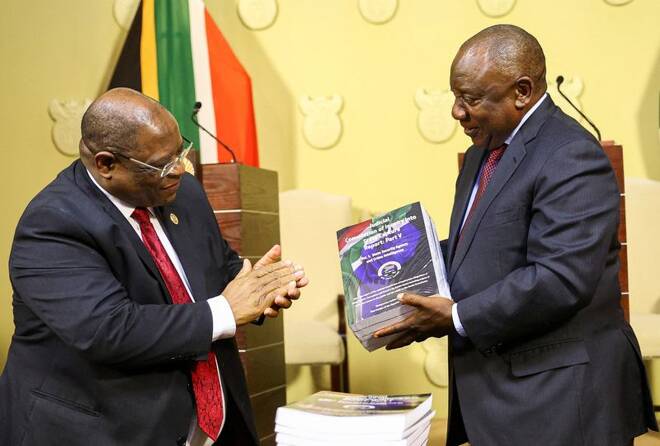Advertisement
Advertisement
S.Africa’s Ramaphosa should have known more about corruption under Zuma – inquiry
By:
By Bhargav Acharya and Tim Cocks JOHANNESBURG (Reuters) - South African President Cyril Ramaphosa told an inquiry into corruption under his predecessor Jacob Zuma that he had no first-hand knowledge of any wrongdoing, only media reports, the final part of the inquiry published on Wednesday showed.
By Bhargav Acharya and Tim Cocks
JOHANNESBURG (Reuters) – South African President Cyril Ramaphosa told an inquiry into corruption under his predecessor Jacob Zuma that he had no first-hand knowledge of any wrongdoing, only media reports, the final part of the inquiry published on Wednesday showed.
But the report also said that, as deputy president at the time, he should have done more towards making his own enquiries, given the responsibilities of his position.
The final instalment of the inquiry chaired by senior judge Raymond Zondo, which examined claims of corruption and fraud under Zuma, is a product of three years of hearings involving some 300 witnesses, including Ramaphosa himself.
It comes at an awkward time for Ramaphosa, as the police are investigating money-laundering accusations against him after millions of dollars were allegedly stolen from his farm, an investigation which he has welcomed.
Ramaphosa also faces a divided party ahead of this year’s African National Congress (ANC) elective conference that will decide whether to give him a second run at president on the party’s ticket in elections expected in 2024.
The Zondo commission was formed in 2018 to examine allegations of high-level graft during Zuma’s nine-year tenure from 2009, in which he is suspected of colluding with businessmen close to him – brothers Atul, Ajay and Rajesh Gupta – to plunder state resources. They deny all wrongdoing.
“Ought he to have known?,” the report asked of Ramaphosa, who was deputy president under Zuma between 2014 and 2018, when he ousted Zuma over the allegations.
“The wealth of evidence before this commission suggests the answer is yes. There was surely enough credible information in the public domain to at least prompt him to inquire and perhaps act on a number of serious allegations.”
Ramaphosa’s office was not immediately available for comment, but on receiving the report, Ramaphosa said the government would come up with an implementation plan for the commission’s proposals within four months.
“The report is … an instrument through which the country can … ensure that such events are never allowed to happen again,” Ramaphosa said.
This month the United Arab Emirates arrested Rajesh and Atul Gupta, where they had fled to after the so-called “state capture” scandal erupted, and South Africa is in the process of trying to get them extradited.
The report also found that the ANC, the legacy party of Nelson Mandela, prioritised “its own survival and strength over the Constitutional obligations of its members”.
The ANC said it would “honestly engage with whatever criticism may be levelled against it”.
(Editing by Ed Osmond)
About the Author
Reuterscontributor
Reuters, the news and media division of Thomson Reuters, is the world’s largest international multimedia news provider reaching more than one billion people every day. Reuters provides trusted business, financial, national, and international news to professionals via Thomson Reuters desktops, the world's media organizations, and directly to consumers at Reuters.com and via Reuters TV. Learn more about Thomson Reuters products:
Did you find this article useful?
Latest news and analysis
Advertisement
